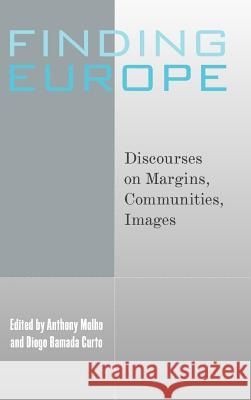Finding Europe: Discourses on Margins, Communities, Images » książka
Finding Europe: Discourses on Margins, Communities, Images
ISBN-13: 9781845452087 / Angielski / Twarda / 2007 / 420 str.
"This is an important collection and starting point for the worthy goal of promoting a better understanding of the past that makes it less able to be manipulated for contemporary political and religious aims...Compiled out of the European past, its aim of a better understanding of traditional values ought to be useful for contemporary cultures and for the work of scholars of all cultures and continents." - Renaissance Quarterly In the last decade or so, many books have been devoted to the history of Europe.Two conceptual axes predominate in a large number of these accounts: a discourse focusing on Europe's values, and another discourse, fashioned largely in opposition to the first, which emphasizes the process of European "construction." The first conceives of Europe's past teleologically, as a process by which certain values (Christian ethics, individualism, capitalism, tolerance, republicanism, due process, etc.) were affirmed and came to define European culture. The second approach rejects the discourse on values emphasizes the post-Enlightenment emergence of the concept of Europe, and the political and ideological implications in its continuous redefinitions (and re elaborations) during the past two or more centuries. This volume offers new approaches that integrate the long temporal dimension of the values-based approach, albeit devoid of its teleological element, with the "constructivist" interpretation.
"This is an important collection and starting point for the worthy goal of promoting a better understanding of the past that makes it less able to be manipulated for contemporary political and religious aims...Compiled out of the European past, its aim of a better understanding of traditional values ought to be useful for contemporary cultures and for the work of scholars of all cultures and continents." · Renaissance QuarterlyIn the last decade or so, many books have been devoted to the history of Europe.Two conceptual axes predominate in a large number of these accounts: a discourse focusing on Europes values, and another discourse, fashioned largely in opposition to the first, which emphasizes the process of European "construction." The first conceives of Europes past teleologically, as a process by which certain values (Christian ethics, individualism, capitalism, tolerance, republicanism, due process, etc.) were affirmed and came to define European culture. The second approach rejects the discourse on values emphasizes the post-Enlightenment emergence of the concept of Europe, and the political and ideological implications in its continuous redefinitions (and re elaborations) during the past two or more centuries. This volume offers new approaches that integrate the long temporal dimension of the values-based approach, albeit devoid of its teleological element, with the "constructivist" interpretation.











